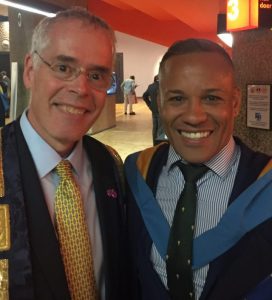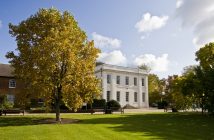
Vice-Chancellor Peter Horrocks with graduate John Spence.
Imagine not doing well at school. Imagine being told you’ll amount to nothing. And imagine carrying that around with you for decades. One of the highlights of my role as Vice-Chancellor is to meet many of our students as they cross the stage to become graduates. And to see the pride and new-found confidence that oozes out of them, some years later.
At his graduation in London, John was shaking so much that he was unable to walk across the stage to collect his degree. I offered him some help and he whispered to me that this was the most extraordinary moment of his life because 30 years previously, when he was just 16, he was told he’d never achieve anything academically.
Achieving his degree meant more than the qualification, it was evidence of his academic ability and he’d proved his doubters wrong. His spirit had been destroyed at school, he’d carried it around with him for many years and it was incredibly humbling when he thanked the OU for rebuilding him, his education and his confidence.
This is a powerful message which continues to highlight the value and importance of what we refer to as lifelong learning, access to education whatever your age, personal circumstances or academic background.
‘Never let anyone else tell you what you are capable of’
And sadly, John is not alone. The publication of John’s story last week encouraged others to come forward and share their experiences. Lots of them. And I’ve enjoyed reading them – not because so many people didn’t get the early academic success they have since proved they are capable of, but that they were able to grasp it later in life and the positive impact it has made.
Mike was told not to do A Levels because he’d be wasting everyone’s time. He got his first degree at 40, followed it with a Masters degree, both with the OU, and on top of that has a Master of Defence Studies with the Royal Military College of Canada. Impressive.
Lynn was told she wasn’t good at maths. She gained her MSc in Mathematics from the OU four years ago.
“Never let anyone else tell you what you are capable of. All you need is a love of the subject and a bucket full of determination!” she says.
Paul left school with only a CSE in Maths but later went on to achieve a BSc in Computing and Mathematical Science. He’s a director of a successful engineering business.
Gina was described as average by her school teachers, something which haunted her for years. She graduated this year with a BA (Hons) in Health and Social Care and has won numerous awards for raising awareness of dementia in her home town of Exeter.
And when does education stop? Well, it shouldn’t have to.
“I was told exactly the same at school. When I left I became a typist and many years later started studying. First a teacher’s certificate in commercial subjects, then qualification as an accountant but the icing on the cake was achieving a BSc (Hons) with the OU. I haven’t finished my education yet!” exclaims Jan.
Living proof of lifelong learning
The OU is the largest academic institution in the UK with almost 170,000 students from all ages and backgrounds, many of whom juggle work and families at the same time. This, on top of confidence issues which manifested themselves at school, makes completing a degree even more special.
 Our student and alumni community are living proof of lifelong learning, that education can be grasped at any point in your life.
Our student and alumni community are living proof of lifelong learning, that education can be grasped at any point in your life.
Education is not just for the young, something the OU highlighted earlier in the year with the #Iwas campaign and part-time distance learning has a huge role to play in plugging the UK skills gap.
I think postgraduate student Chloe hits the nail on the head:
We’re often made to feel like our one chance of academic success is granted at school. So when some of us don’t achieve that success, we’re told oh well, you’re not an academic. When, actually, the chance is always there waiting in the wings until we decide to make another grasp for it.
“The OU is a wonderful place that allows people to break down the limits they or others have put on them,” says Chloe, who has a business degree with the OU and is now studying creative writing with us.
Do you have an experience of being dismissed academically when you were younger? How did you overcome that? And what more can the OU do to help those who’ve had poor early educational experiences take advantages of opportunities later in life? I’d be very interested in hearing your thoughts.



